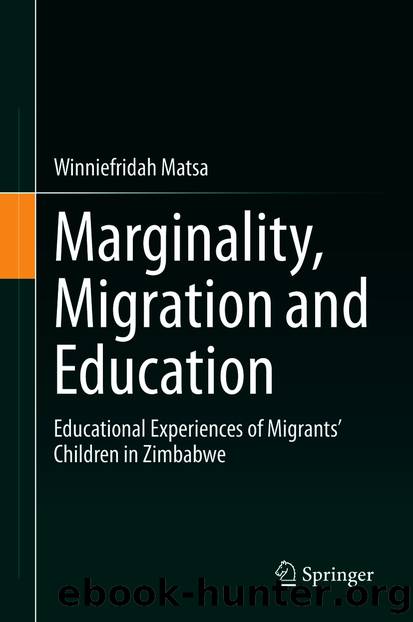Marginality, Migration and Education by Winniefridah Matsa

Author:Winniefridah Matsa
Language: eng
Format: epub
ISBN: 9783030608736
Publisher: Springer International Publishing
Low-Cost Boarding Schools
Low-cost boarding schools are rural day secondary schools providing less formal boarding facilities to learners at a low cost. There are about three low-cost boarding schools in Mangwe and three in Bulilima. Some are continually being upgraded and expanded to make them formal or near-formal. The low-cost boarding are legal, known by the ministry of education and are supervised by the ministry, despite that it is an endeavour by parentsâ associations to provide affordable accommodation to curb distances and costs charged by mission and government boarding schools. There is a government circular that regulates how they should be run by school development association of parents. The government does not fund low-cost boarding schools, and there are no non-governmental organisations that sponsor them. However, the government does not take total responsibility but only play a regulatory role. Parents also cannot afford the standard provisions as these are funded by poor parents who cannot afford conventional boarding schools. Lack of funding becomes a serious problem. Parents charge affordable levies they see fit for approval by government.
Accommodation, infrastructure and equipment for use is sourced by parents. Four of these have reliable electricity supply for lighting system, excellent water and other amenities making them conducive for learning. The ministry of health sometimes carry out inspections conducted by Environmental health Technicians (EHT) or Environmental Safety Technicians (EST). Low-cost boardings do not have health centres or clinics as is in mission and government boarding schools. Schools also have no formal security by way of security guards, alarm systems or electric charged wires. Theft is very common.
The majority of learners in low-cost boarding in Bulilima and Mangwe are children of migrants who cannot afford government or mission boarding schools. The children are taken care of by school superintendents or matrons. These are local people with no qualifications of being board masters and matrons. However, they are formally selected through interviews and a criterion of their behaviour, care, minimal education and social standing in the community. The cooks are also locals from the community who also do not have qualifications as cooks. There are no resident pastors or chaplains as is the case in mission schools. Guidance and counselling is done by teachers.
The facilities are affordable compared to conventional boarding schools. The cost is made cheaper by the fact that sometimes groceries and toiletries which are cheaper in South Africa and Botswana are sent as goods than money. Learners pull food resources together. They bring varieties of food from home fortnightly or monthly.
The rationale for the emergence of low-cost boarding is that in the two districts; there are no government boarding schools but only mission boarding schools which are expensive. Mission schools accept students on payment plans and give first preference to learners from their denominations. In Bulilima, there are Methodist, Seventh Day Adventist and UCCSA (traditionally known as London Missionary Society) mission boarding schools and in Mangwe there are Roman Catholic, Anglican and Salvation Army mission schools, some of which are single sex schools. Low-cost
Download
This site does not store any files on its server. We only index and link to content provided by other sites. Please contact the content providers to delete copyright contents if any and email us, we'll remove relevant links or contents immediately.
| Anthropology | Archaeology |
| Philosophy | Politics & Government |
| Social Sciences | Sociology |
| Women's Studies |
Cecilia; Or, Memoirs of an Heiress — Volume 1 by Fanny Burney(31331)
Cecilia; Or, Memoirs of an Heiress — Volume 3 by Fanny Burney(30933)
Cecilia; Or, Memoirs of an Heiress — Volume 2 by Fanny Burney(30889)
The Great Music City by Andrea Baker(21262)
We're Going to Need More Wine by Gabrielle Union(18072)
Bombshells: Glamour Girls of a Lifetime by Sullivan Steve(13107)
Pimp by Iceberg Slim(12928)
All the Missing Girls by Megan Miranda(12746)
Fifty Shades Freed by E L James(12448)
Norse Mythology by Gaiman Neil(11879)
Talking to Strangers by Malcolm Gladwell(11874)
Crazy Rich Asians by Kevin Kwan(8346)
Mindhunter: Inside the FBI's Elite Serial Crime Unit by John E. Douglas & Mark Olshaker(7832)
The Lost Art of Listening by Michael P. Nichols(6469)
Enlightenment Now: The Case for Reason, Science, Humanism, and Progress by Steven Pinker(6405)
Bad Blood by John Carreyrou(5766)
The Four Agreements by Don Miguel Ruiz(5510)
Weapons of Math Destruction by Cathy O'Neil(5034)
We Need to Talk by Celeste Headlee(4868)
